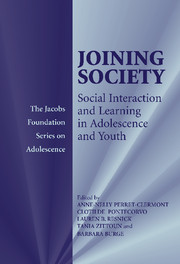Book contents
- Frontmatter
- Contents
- List of Contributors
- Foreword
- Preface
- I Introduction
- 1 Thinking Spaces of the Young
- 2 Prospects for Youth in Postindustrial Societies
- 3 Overview of the Volume
- II Youth-Constructed Socialization
- III Personal Agency Through Collective Activity
- IV Learning in Practice and Discourse
- V Intergenerational Sites for Thinking
- VI Pathways to Adulthood in National Context
- Index
- References
1 - Thinking Spaces of the Young
Published online by Cambridge University Press: 08 January 2010
- Frontmatter
- Contents
- List of Contributors
- Foreword
- Preface
- I Introduction
- 1 Thinking Spaces of the Young
- 2 Prospects for Youth in Postindustrial Societies
- 3 Overview of the Volume
- II Youth-Constructed Socialization
- III Personal Agency Through Collective Activity
- IV Learning in Practice and Discourse
- V Intergenerational Sites for Thinking
- VI Pathways to Adulthood in National Context
- Index
- References
Summary
When and how can appropriate thinking spaces offer young people the resources to face life's challenges? Thinking is considered here in the large sense of a dynamic mental activity, both cognitive and symbolic, an alternative to acting out or to reacting. Under certain conditions that permit it, the individual develops in what may be viewed as the continuation of Winnicott's (1971) transitional space or what we designate as thinking spaces, which pertain to both the self and the nonself and allow us to elaborate both fantasy and images of reality. The thinking space is the frontier of freedom in the psychic activity in which the individual elaborates the perceived reality in order to represent or symbolize it and to become able to reflect on it.
Expanding still more on Winnicott's model, we also consider the thinking space in its social dimension. Thinking has its roots in collective activities that permit or even provoke it. The child and the young enter communities of practice that make more or less explicit (first during feeding and nurturing time; then, around play and daily routines; later, in more formal teaching, cultural socialization, leisure, professional training, and work activities) their thinking and the discursive fruits of it. In dialogues, the child and later the adolescent are called upon as cothinkers or challenged with issues on which they have to take a stance.
- Type
- Chapter
- Information
- Joining SocietySocial Interaction and Learning in Adolescence and Youth, pp. 3 - 10Publisher: Cambridge University PressPrint publication year: 2003
References
- 5
- Cited by

